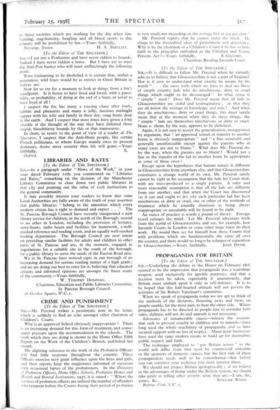[To the Editor of THE SPECTATOR.] SIR,—It is difficult to
follow Mr. Percival when he virtually asks us to believe that Gloucestershire is not a part of England. Nor is it easy to understand what exactly he means by his words " . . . the cases with which we have to deal are those of simple country lads who do mischievous, dirty or cruel things which ought to be discouraged." In what sense is " simple " used ? Does Mr. Percival mean that all lads in Gloucestershire are stolid and unimaginative ; or that they are all below the average in knowledge and wits ? And when they do mischievous, dirty or cruel things, this must surely mean that at the moment when they do these things, the " simple " lads are themselves mischievous or dirty or cruel. None o them, by the way, appears to be dishonest.
Again, it is not easy to accept the generalisation, unsupported by argument, that " an approved school or transfer to another home is obviously inappropriate " and " a fine unsuitable and generally unenforceable except against the parents who in many cases are not to blame." What does Mr. Percival do, by the way, when the parents are to blame ? Would not a fine or the transfer of the lad to another home be appropriate in some of those cases ?
Except upon the hypotheses that human nature is different in Gloucestershire from anywhere else, and that Gloucestershire constitutes a strange world of its own, Mr. Percival surely cannot be right in his assumption that the lads his Court deals with are mass-produced to a single pattern. A safer and more reasonable assumption is that all the lads are different from one another, and that when the Court has discovered (as it can and ought to do) why each particular lad has been mischievous or dirty or cruel, one or other of the methods of treatment which he roundly dismisses as being always inappropriate or unsuitable will be found to be right.
An ounce of practice is worth a pound of theory. Foreign travel enlarges the mind. Let Mr. Percival adventure forth from the world of Gloucestershire and see, for example, how Juvenile Courts in London or some other large town do their work. He would then see for himself how those Courts deal with problems which are fundamentally the same all over the country, and there would no longer be a danger of separatism
in Gloucestershire.—Yours faithfully, JOHN DAVID.
















































 Previous page
Previous page